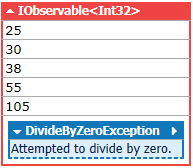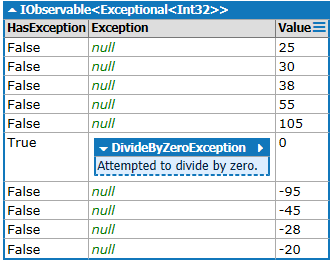Rx is a functional paradigm so it's very useful to use a functional approach to solving this problem.
The answer is to introduce another monad that can cope with errors, like Nullable<T> can cope with integers having a null value, but in this case a class that can either represent a value or an exception.
public class Exceptional
{
public static Exceptional<T> From<T>(T value) => new Exceptional<T>(value);
public static Exceptional<T> From<T>(Exception ex) => new Exceptional<T>(ex);
public static Exceptional<T> From<T>(Func<T> factory) => new Exceptional<T>(factory);
}
public class Exceptional<T>
{
public bool HasException { get; private set; }
public Exception Exception { get; private set; }
public T Value { get; private set; }
public Exceptional(T value)
{
this.HasException = false;
this.Value = value;
}
public Exceptional(Exception exception)
{
this.HasException = true;
this.Exception = exception;
}
public Exceptional(Func<T> factory)
{
try
{
this.Value = factory();
this.HasException = false;
}
catch (Exception ex)
{
this.Exception = ex;
this.HasException = true;
}
}
public override string ToString() =>
this.HasException
? this.Exception.GetType().Name
: (this.Value != null ? this.Value.ToString() : "null");
}
public static class ExceptionalExtensions
{
public static Exceptional<T> ToExceptional<T>(this T value) => Exceptional.From(value);
public static Exceptional<T> ToExceptional<T>(this Func<T> factory) => Exceptional.From(factory);
public static Exceptional<U> Select<T, U>(this Exceptional<T> value, Func<T, U> m) =>
value.SelectMany(t => Exceptional.From(() => m(t)));
public static Exceptional<U> SelectMany<T, U>(this Exceptional<T> value, Func<T, Exceptional<U>> k) =>
value.HasException ? Exceptional.From<U>(value.Exception) : k(value.Value);
public static Exceptional<V> SelectMany<T, U, V>(this Exceptional<T> value, Func<T, Exceptional<U>> k, Func<T, U, V> m) =>
value.SelectMany(t => k(t).SelectMany(u => Exceptional.From(() => m(t, u))));
}
So, let's start by creating an Rx query that throws an exception.
IObservable<int> query =
Observable
.Range(0, 10)
.Select(x => 5 - x)
.Select(x => 100 / x)
.Select(x => x + 5);
If I run the observable I get this:
![Normal Query]()
Let's transform this with with Exceptional and see how it allows us to continue processing when an error occurs.
IObservable<Exceptional<int>> query =
Observable
.Range(0, 10)
.Select(x => x.ToExceptional())
.Select(x => x.Select(y => 5 - y))
.Select(x => x.Select(y => 100 / y))
.Select(x => x.Select(y => y + 5));
Now when I run it I get this:
![Query with Exceptional]()
Now I could test each result, see if HasException is true and log each exception, meanwhile the observable continues.
Finally, it's easy to clean up the query to look almost the same as the original by introducing one further extension method.
public static IObservable<Exceptional<U>> Select<T, U>(this IObservable<Exceptional<T>> source, Func<T, U> m) =>
source.Select(x => x.SelectMany(y => Exceptional.From(() => m(y))));
This combines observables and exceptionals into a single Select operator.
Now the query can look like this:
IObservable<Exceptional<int>> query =
Observable
.Range(0, 10)
.Select(x => x.ToExceptional())
.Select(x => 5 - x)
.Select(x => 100 / x)
.Select(x => x + 5);
I get the same result at before.
Finally, I could get this all working with query syntax by adding two more extension methods:
public static IObservable<Exceptional<U>> SelectMany<T, U>(this IObservable<T> source, Func<T, Exceptional<U>> k) =>
source.Select(t => k(t));
public static IObservable<Exceptional<V>> SelectMany<T, U, V>(this IObservable<T> source, Func<T, Exceptional<U>> k, Func<T, U, V> m) =>
source.SelectMany(t => k(t).SelectMany(u => Exceptional.From(() => m(t, u))));
This allows:
IObservable<Exceptional<int>> query =
from n in Observable.Range(0, 10)
from x in n.ToExceptional()
let a = 5 - x
let b = 100 / a
select b + 5;
Again, I get the same results as before.



Retryrather than just logging? Better stillRetryWithBackoffStrategy. Cut's down on human intervention – IvonUploadAsset)? You might find that waiting a bit succeeds. Errors might not always come from some compute operation (which might tend to fail repeatedly if its duff data so I agree with you there) – Ivon